英语连读规则
英语连读规则大全
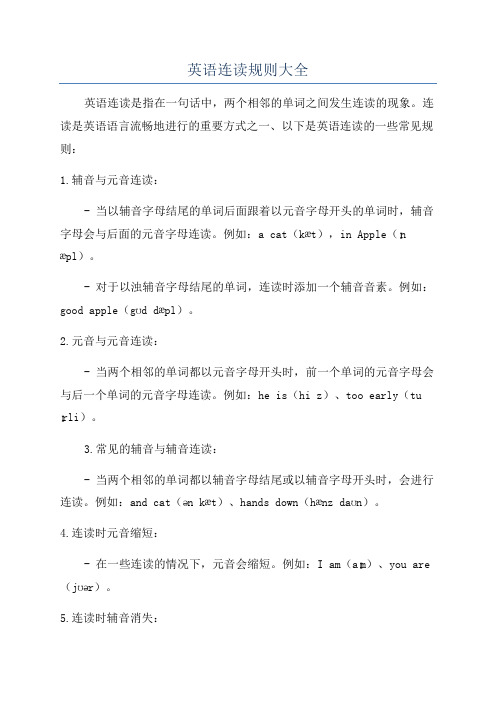
英语连读规则大全英语连读是指在一句话中,两个相邻的单词之间发生连读的现象。
连读是英语语言流畅地进行的重要方式之一、以下是英语连读的一些常见规则:1.辅音与元音连读:- 当以辅音字母结尾的单词后面跟着以元音字母开头的单词时,辅音字母会与后面的元音字母连读。
例如:a cat(kæt),in Apple(ɪnæpl)。
- 对于以浊辅音字母结尾的单词,连读时添加一个辅音音素。
例如:good apple(gʊd dæpl)。
2.元音与元音连读:- 当两个相邻的单词都以元音字母开头时,前一个单词的元音字母会与后一个单词的元音字母连读。
例如:he is(hi z)、too early(tu ɪrli)。
3.常见的辅音与辅音连读:- 当两个相邻的单词都以辅音字母结尾或以辅音字母开头时,会进行连读。
例如:and cat(ən kæt)、hands down(hænz daʊn)。
4.连读时元音缩短:- 在一些连读的情况下,元音会缩短。
例如:I am(aɪm)、you are (jʊər)。
5.连读时辅音消失:- 在一些连读的情况下,辅音会消失或减轻发音。
例如:this is(ðɪz)、have to(hæftʊ)。
6.连读时辅音变化:- 在一些连读的情况下,辅音会发生变化。
例如:at the(ædə)、had to(hædə)。
7.连读时舌尖音符号变化:- 当相邻的词以舌尖音符号结尾时,会变成舌根音符号。
例如:thick hair(θɪɡ keər)。
8.冠词与名词的连读:- 当冠词"the"与以元音字母开头的名词相连时,发生连读。
例如:the apple(ði æpl)。
9.数词与名词的连读:- 在一些情况下,当以单数的数词开头的名词连读时,数词的发音会变得更轻,名词的发音会变得更强。
英语发音连读规则总结
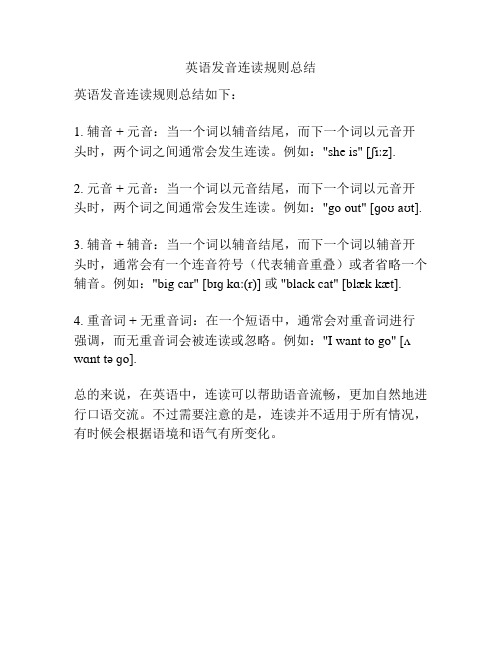
英语发音连读规则总结
英语发音连读规则总结如下:
1. 辅音 + 元音:当一个词以辅音结尾,而下一个词以元音开头时,两个词之间通常会发生连读。
例如:"she is" [ʃiːz].
2. 元音 + 元音:当一个词以元音结尾,而下一个词以元音开头时,两个词之间通常会发生连读。
例如:"go out" [ɡoʊ aʊt].
3. 辅音 + 辅音:当一个词以辅音结尾,而下一个词以辅音开头时,通常会有一个连音符号(代表辅音重叠)或者省略一个辅音。
例如:"big car" [bɪɡ kɑː(r)] 或 "black cat" [blæk kæt].
4. 重音词 + 无重音词:在一个短语中,通常会对重音词进行强调,而无重音词会被连读或忽略。
例如:"I want to go" [ʌ
wɑnt tə ɡo].
总的来说,在英语中,连读可以帮助语音流畅,更加自然地进行口语交流。
不过需要注意的是,连读并不适用于所有情况,有时候会根据语境和语气有所变化。
英语连读的规则与技巧

英语连读的规则与技巧英语连读是指在两个单词之间,或在单词的词素之间,音素之间连续流畅地发音的现象。
英语连读的规则和技巧可以帮助提高口语表达的流利性和自然性。
以下是一些英语连读的规则和技巧:1. 辅音连读:当一个单词以辅音结尾,下一个单词以元音开头时,可以将两个辅音连读起来。
例如,"black cat"发音为/blæk kæt/而不是/blæk kæt/。
2. 辅音加强连读:当一个单词以辅音结尾,下一个单词以相同或相似的辅音开头时,可以将两个辅音连读起来,并加强第一个辅音的发音。
例如,"long game"发音为/lɔŋgeɪm/而不是/lɔŋ gæm/。
3. 元音连读:当一个单词以元音结尾,下一个单词以元音开头时,可以将两个元音连读起来。
例如,"he is"发音为/hiːz/而不是/hiː ɪz/。
4. 弱元音连读:当一个单词以辅音结尾,下一个单词以弱元音开头时,可以将两个单词的辅音和弱元音连读起来。
例如,"at all"发音为/əˈtɔːl/而不是/ət ɔːl/。
5. 连续连读:当句子中有多个连读现象时,可以将相邻的单词连读起来,以提高语音的流畅性。
例如,"I am going to"发音为/aɪəm ˈɡəʊɪŋtə/而不是/aɪæm ˈɡəʊɪŋ tuː/。
6. 弱读:一些常用的功能词,如冠词、连词、助动词等在连读时会被忽略或减弱发音,以使句子更流畅。
例如,"I am going to the park"可以快速发音成/ˈaɪəm ˈɡəʊɪŋtə ðə pɑːk/。
7. 连读时的重音:在连读时,重音在第一个单词上,而后续的单词可以保持较轻的发音。
例如,"black cat"中的"black"重音较重,而"cat"重音较轻。
英语连读规则总结
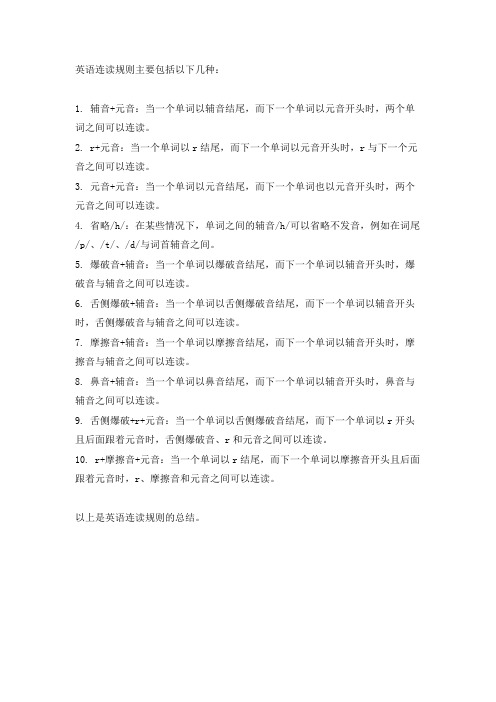
英语连读规则主要包括以下几种:
1. 辅音+元音:当一个单词以辅音结尾,而下一个单词以元音开头时,两个单词之间可以连读。
2. r+元音:当一个单词以r结尾,而下一个单词以元音开头时,r与下一个元音之间可以连读。
3. 元音+元音:当一个单词以元音结尾,而下一个单词也以元音开头时,两个元音之间可以连读。
4. 省略/h/:在某些情况下,单词之间的辅音/h/可以省略不发音,例如在词尾/p/、/t/、/d/与词首辅音之间。
5. 爆破音+辅音:当一个单词以爆破音结尾,而下一个单词以辅音开头时,爆破音与辅音之间可以连读。
6. 舌侧爆破+辅音:当一个单词以舌侧爆破音结尾,而下一个单词以辅音开头时,舌侧爆破音与辅音之间可以连读。
7. 摩擦音+辅音:当一个单词以摩擦音结尾,而下一个单词以辅音开头时,摩擦音与辅音之间可以连读。
8. 鼻音+辅音:当一个单词以鼻音结尾,而下一个单词以辅音开头时,鼻音与辅音之间可以连读。
9. 舌侧爆破+r+元音:当一个单词以舌侧爆破音结尾,而下一个单词以r开头且后面跟着元音时,舌侧爆破音、r和元音之间可以连读。
10. r+摩擦音+元音:当一个单词以r结尾,而下一个单词以摩擦音开头且后面跟着元音时,r、摩擦音和元音之间可以连读。
以上是英语连读规则的总结。
史上最全的英语连读规则一网打尽
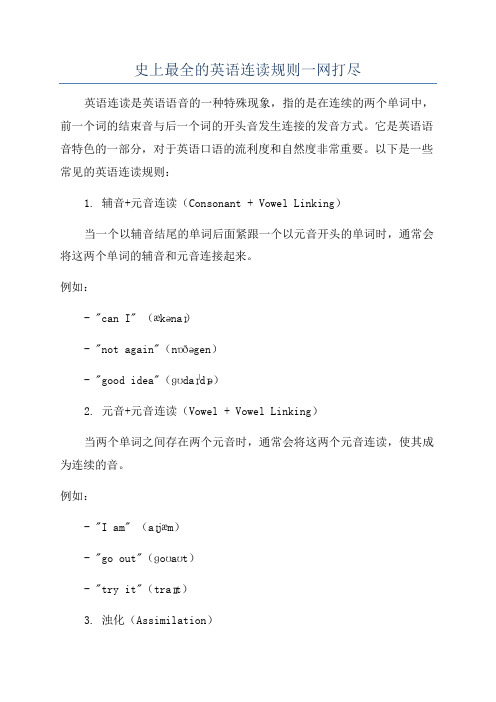
史上最全的英语连读规则一网打尽英语连读是英语语音的一种特殊现象,指的是在连续的两个单词中,前一个词的结束音与后一个词的开头音发生连接的发音方式。
它是英语语音特色的一部分,对于英语口语的流利度和自然度非常重要。
以下是一些常见的英语连读规则:1. 辅音+元音连读(Consonant + Vowel Linking)当一个以辅音结尾的单词后面紧跟一个以元音开头的单词时,通常会将这两个单词的辅音和元音连接起来。
例如:- "can I" (ækənaɪ)- "not again"(nɒðəgen)- "good idea"(ɡʊdaɪˈdɪə)2. 元音+元音连读(Vowel + Vowel Linking)当两个单词之间存在两个元音时,通常会将这两个元音连读,使其成为连续的音。
例如:- "I am" (aɪjæm)- "go out"(ɡoʊaʊt)- "try it"(traɪɪt)3. 浊化(Assimilation)当一个以清辅音结尾的单词后面紧跟一个以辅音开头的单词时,清辅音(如/p/,/t/,/k/等)通常会变成其相应的浊辅音(如/b/,/d/,/ɡ/等)。
例如:- "cup of tea"(kʌbəvˈtiː)- "that guy"(ðæɡaɪ)- "big dog"(bɪdoɡ)4. 借音(Epenthesis)当一个以元音结尾的单词后面紧跟一个以辅音开头的单词时,在这两个单词之间通常会插入一个短促的/i/音(schwa)。
例如:- "crazy idea"(kreɪziˈaɪdiə)- "my old"(maɪoʊld)5. 弱元音免略(Weak Vowel Deletion)在一些情况下,一个单词中的弱元音(如/i/,/ə/)可能会被省略掉,使得两个单词的发音更加流畅。
英语连读规则大全实用
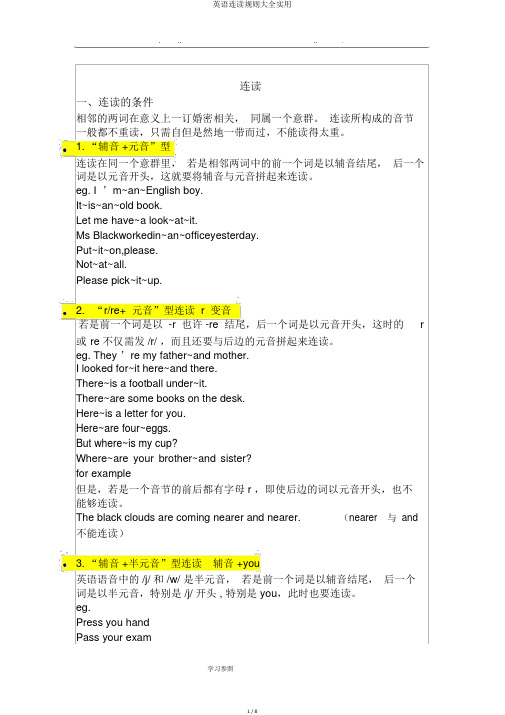
......连读一、连读的条件相邻的两词在意义上一订婚密相关,同属一个意群。
连读所构成的音节一般都不重读,只需自但是然地一带而过,不能读得太重。
1.“辅音 +元音”型连读在同一个意群里,若是相邻两词中的前一个词是以辅音结尾,后一个词是以元音开头,这就要将辅音与元音拼起来连读。
eg. I ’m~an~English boy.It~is~an~old book.Let me have~a look~at~it.Ms Blackworkedin~an~officeyesterday.Put~it~on,please.Not~at~all.Please pick~it~up.2.“r/re+ 元音”型连读 r 变音若是前一个词是以 -r 也许 -re 结尾,后一个词是以元音开头,这时的r 或re 不仅需发 /r/ ,而且还要与后边的元音拼起来连读。
eg. They ’re my father~and mother.I looked for~it here~and there.There~is a football under~it.There~are some books on the desk.Here~is a letter for you.Here~are four~eggs.But where~is my cup?Where~are your brother~and sister?for example但是,若是一个音节的前后都有字母 r ,即使后边的词以元音开头,也不能够连读。
The black clouds are coming nearer and nearer.(nearer与and 不能连读)3.“辅音 +半元音”型连读辅音 +you英语语音中的 /j/ 和 /w/ 是半元音,若是前一个词是以辅音结尾,后一个词是以半元音,特别是 /j/ 开头 , 特别是 you,此时也要连读。
eg.Press you handPass your examguess your ageDid you see itdid you like itThank~you.Nice to meet~you.Did~you get there late~again?Would~you like~a cup~of tea?Could~you help me, please?“音的同化”—常把 /d/+/j/ 读成 /dV/ ,did you 听上成了 /dIdVu/ ,would you 成了 /wudVu/ , could you 成了 /kudVu/ 。
英语连读六大规则
英语连读六大规则英语连读是指在连续的两个单词之间,一个词以元音音素结尾,而下一个词以元音音素开头时,两个词的辅音音素之间会发生连读的现象。
这有助于提高语音的流畅度。
以下是英语连读的六大规则:1. 辅音+ 元音:- 当一个词以辅音结尾,而下一个词以元音开头时,两个词之间通常发生连读。
例如:"go out" 中的"go" 和"out" 在语音上形成连读。
2. 元音+ 元音:- 如果一个词以元音结尾,而下一个词也以元音开头,通常会发生连读。
例如:"I am" 中的"I" 和"am" 在语音上形成连读。
3. 浊音+ 有声辅音:- 当一个词以浊音(voiced sound)结尾,而下一个词以有声辅音(voiced consonant)开头时,通常发生连读。
例如:"it's time" 中的"it's" 和"time" 在语音上形成连读。
4. 清音+ 无声辅音:- 当一个词以清音(voiceless sound)结尾,而下一个词以无声辅音(voiceless consonant)开头时,通常发生连读。
例如:"big cat" 中的"big" 和"cat" 在语音上形成连读。
5. 双辅音+ 元音:- 当一个词以两个辅音相连,而下一个词以元音开头时,通常发生连读。
例如:"last apple" 中的"last" 和"apple" 在语音上形成连读。
6. 相同辅音:- 如果两个相邻的词有相同的辅音,它们通常会发生融合,形成一个较长的辅音。
例如:"have eggs" 中的"have" 和"eggs" 在语音上形成融合。
英语连读规则大全
连读一、连读的条件相邻的两词在意义上必须密切相关,同属一个意群。
连读所构成的音节一般都不重读,只需顺其自然地一带而过,不可读得太重。
∙ 1.“辅音+元音”型连读在同一个意群里,如果相邻两词中的前一个词是以辅音结尾,后一个词是以元音开头,这就要将辅音与元音拼起来连读。
eg. I’m~an~English boy.It~is~an~old book.Let me have~a look~at~it.Ms Blackworkedin~an~officeyesterday.Put~it~on,please.Not~at~all.Please pick~it~up.∙ 2. “r/re+元音”型连读 r变音如果前一个词是以-r或者-re结尾,后一个词是以元音开头,这时的r 或re不但要发/r/,而且还要与后面的元音拼起来连读。
eg. They’re my father~and mother.I looked for~it here~and there.There~is a football under~it.There~are some books on the desk.Here~is a letter for you.Here~are four~eggs.But where~is my cup?Where~are your brother~and sister?for example但是,如果一个音节的前后都有字母r,即使后面的词以元音开头,也不能连读。
The black clouds are coming nearer and nearer.(nearer与and 不可连读)∙ 3.“辅音+半元音”型连读辅音+you英语语音中的/j/和/w/是半元音,如果前一个词是以辅音结尾,后一个词是以半元音,特别是/j/开头,特别是you,此时也要连读。
eg.Press you handPass your examguess your ageDid you see itdid you like itThank~you.Nice to meet~you.Did~you get there late~again?Would~you like~a cup~of tea?Could~you help me, please?“音的同化”—常把/d/+/j/读成/dV/,did you听上成了/dIdVu/,would you成了 /wudVu/,could you成了 /kudVu/。
(完整版)英语连读规则(整理版)
连读连读的条件:相邻的两词在意义上必须密切相关,同属一个意群。
连读所构成的音节一般都不重读,只需顺其自然地一带而过,不可读得太重,也不可音。
(连读符号:~)(1)“辅音+元音”型连读在同一个意群里,如果相邻两词中的前一个词是以辅音结尾,后一个词是以元音开头,这就要将辅音与元音拼起来连读。
I’m~an~English boy It~is~an~old book Let me have~a look~at~it.Ms Black worked in~an~office last~yesterday.I called~you half~an~hour~ago.Put~it~on, please.Not~at~all.Please pick~it~up.(2)“辅音+辅音”型连读叠合:即前面单词尾音辅音于紧随其后的单词的起始辅音为同一音时,只需读一次,而不必将这个音读两次。
这种情形常发生在[p]、[b]、[t]、[d]、[k]、[g]等辅音出现的时候。
失去爆破:顾名思义,指爆破音失去爆破。
发生的条件如下:当前面的单词以[p]、[b]、[t]、[d]、[k]、[g]这六个爆破音中的任何一个结尾,而紧随其后的单词是以辅音开头的,这时前面单词中的爆破音失去爆破,即由相关的发音器官做好这个发音的姿势,稍做停顿后即发后面的爆破音。
1.“爆破音+爆破音”型6个爆破音中的任意2个相临时,爆破前一个爆破音会失去,即由相关的发音器官做好这个发音的姿势,稍做停顿后即发后面的爆破音。
The girl in the re(d) coat was on a bla(ck) bike jus(t) now.The bi(g) bus from the fa(c) tory is full of people.Wha(t) time does he get up every morning?This is an ol(d) pi(c)ture of a bi(g) car.The ol(d) do(c)tor has a ca(t), too.We’re going to work on a farm nex(t) Tuesday.What would you like, ho(t) tea or bla(ck) coffee?It’s a very col(d) day, but it’s a goo(d) day.You can put i(t) down in the bi(g) garden.I bought a chea(p) book, but it’s a goo(d) book.2.“爆破音+摩擦音”型如果前面是爆破音,其后紧跟着某些摩擦音(如/f/,/s/,/W/,/T/等),那么前面那个爆破音仅有十分轻微的爆破,而后面那个摩擦音则要完全爆破。
英语连读的规则
英语连读的规则
英语连读是一种快速、自然的语音表达方式,在英语口语中广泛使用。
其规则如下:
1. 声母连读:单词的结尾是辅音,下一个单词的开头也是辅音时,两个辅音顺序相连形成一个新的辅音。
比如:“cupboard is”连读为[kʌpbɔrdɪz]。
2. 元音连读:相邻的两个单词都以元音结尾或开头时,连读成一个长元音或双元音。
比如:“she is”连读为[ʃi:z]。
3. 省略连接词的连读:在口语中,常省略连接词进行连读。
比如:“I'm gonna”连读为[aɪm'gʌnə]。
4. 连读的速度和语调:口语中连读的速度要比书面语要快,需要注意语调的变化,重读和弱读的变化,这样才能让连读表达更加自然。
总之,英语连读是英语口语中不可或缺的一部分,需要注意练习和灵活使用。
- 1、下载文档前请自行甄别文档内容的完整性,平台不提供额外的编辑、内容补充、找答案等附加服务。
- 2、"仅部分预览"的文档,不可在线预览部分如存在完整性等问题,可反馈申请退款(可完整预览的文档不适用该条件!)。
- 3、如文档侵犯您的权益,请联系客服反馈,我们会尽快为您处理(人工客服工作时间:9:00-18:30)。
Two years ago I broke my arm playing football. 解析:playing football 现在分词作伴随状语
现在分词作状语: 1、表示时间:(相当于表示时间的状语从句)
Looking out of the window, I saw groups pf students passing by the classroom. =When I looked out of the window…….. Working in the field, the peasants talked and laughed(=While they were working in the field) merrily. While working in the factory, I learned a lot from the workers.
1. Can you lie down, please? E.g. He lay down on the sofa and soon
fell asleep. lie -- lay --- lain-- lying 位于;躺 lie – lied --- lied --- lying 撒谎 lay --- laid --- laid ---laying 放,搁;
because or because of The sports meeting was out off __b_e_c_a_u_s_e_o_f__
the rain.
He was punished just ___b_e_c_a_u_s_e_o_f_ what he had said.
I went to bed early _b_e_c_a_u_se__I was tired.
He picked up French when he was in France.
My radio can pick up some English programs, such as BBC.
I was stupid enough to play football in the rain.
形容词(副词)+enough to do…. 表示够…..;达到了做某件事的地步
2、表示原因:(相当于原因状语从句) Not knowing what to do, he came to me for help. =As he didn’t know what to do,….
3、表示方式,伴随情况以及结果 The child fell, striking his head against the door.
下蛋,产卵
2. have / run a temperature = have a fever
take one’s temperature
3. write sb. a prescription
4. have a sore throat
2. pick up
My wife is going to pick me up in half an hour.
• Could~you help me, please?
“音的同化”
• did you/would you/could you
(4) “元音+元音”型连读 • 如果前一个词以元音结尾,后一个词以元音
开头,这两个音往往也要自然而不间断地连 读到一起。
• I~am Chinese. • He~is very friendly to me. • She wants to study~English. • She can’t carry~it.
Doctor:
•What seems to be the problem? Patient:
•How long has this been going •My head hurts and I feel
on?
really tired all the time.
•Have you any other symptoms? •It started two weeks ago.
pain in my chest. •What do you think the problem is?
•What do you think I should
do?
Writing – 2. Finding out connection.
Could you find out the logical connection between the sentences in Part 1 which leads to the answer. Then fill in the form below.
The storm did great _d_a_m_a_g_e_(_h_a_rm__) to the crops. 损失,不是伤痛
The__h_u_r_t _ to his feelings is more serious than that in his body. 精神上,感情上,肉体上
Detailed reading
Activity 1: Read the passage and find out the main idea of each paragraph.
P1 Different countries have different ways of health care system.
P2 The advantages and disadvantages of the health care system in Britain.
P3 Things and problems of the health care system in America.
P4 Things about the health care system in Canada.
英语连读规则
• 连读 : 在连贯地说话或朗读时,在同一个意 群(即短语或从句)中,如果相邻的两个词前 者以辅音音素结尾,后者以元音音素开头,就 要自然地将辅音和元音相拼,构成一个音节, 这就是连读。
• Not at all! • Please take a look at it. • There is a book in it.
Am private-owned hospitals; Poorer people private health insurance can not afford it.
free for citizens; privateCa owned hospitals; paid by Not known.
the government
1. Prediction: What do you think the passage is about, according to the pictures in Cultural Corner?
2. Which country’s health care system do you think is the best? How much do you know about them?
The bus stopped and picked up the passengers.
He picked up his book and went away.
Where did you pick up your bad habits?
Pick up your room before you leave.
Injury, hurt, wound, harm, damage
He got serious __in_j_u_ri_e_s__ to the legs at work. 平时创伤,伤害
The soldier received two __w_o_u_n_d_s__ in the battle. 战争
•Do you have a sore throat or •I get dizzy sometimes and
பைடு நூலகம்
running?
my legs feel weak.
•It sounds like you have the flu. •I just have a cough and
•Take the medicine and get enough rest.
(1)“辅音+元音”型连读 • I’m~an~English boy. • It~is~an~old book. • Let me have~a look~at~it. • Put~it~on, please. • Please pick~it~up. (2)“r/re+元音”型连读 • I looked for~it here~and there. • There~is a football under~it. • Here~is a letter for you. • But where~is my cup?
Module 1
➢ Pronunciation ➢Cultural Corner ➢ Speaking and writing
Pronunciation - Liaison
Listen and mark the sounds which are linked.
1. My chest hurts. 2. I’ve got a temperature. 3. I’ll write you a prescription. 4. Pick me up at the hospital. 5. I’ll be off work for a week. 6. She will visit you this afternoon.
Task: Seeing a doctor(10m)
❖ Work with your partner. Tell your partner about your health problems. Partner should give suggestions. You may want to use the following:
